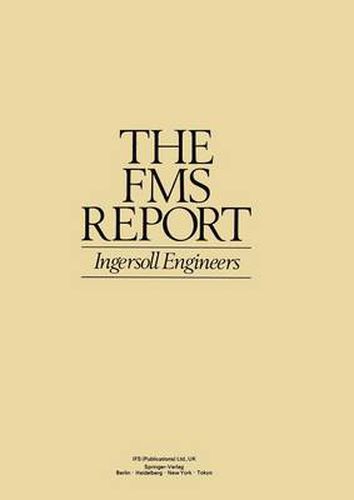Readings Newsletter
Become a Readings Member to make your shopping experience even easier.
Sign in or sign up for free!
You’re not far away from qualifying for FREE standard shipping within Australia
You’ve qualified for FREE standard shipping within Australia
The cart is loading…






This title is printed to order. This book may have been self-published. If so, we cannot guarantee the quality of the content. In the main most books will have gone through the editing process however some may not. We therefore suggest that you be aware of this before ordering this book. If in doubt check either the author or publisher’s details as we are unable to accept any returns unless they are faulty. Please contact us if you have any questions.
ompanies are turning increasingly to FMS, or Flexible C Manufacturing Systems, to improve their performance. They see FMS as a business-driven route to improved profitability through reduced lead-times, rapid response to market conditions, increased flexibility and lower manning. However, since The FMS Report was first written many more firms have begun the exciting task of evaluating, and in some cases, adopting, flexible manufacturing systems to improve their business position and their manufacturing effectiveness. The practical experiences of these firms have not only served to reinforce the need for The FMS Report in the first place, but they have underscored its message. But these practical experiences have had another effect. They have pulled into even sharper focus than before the four pivotal issues which are fundamental to the successful implementation of FMS: namely, principles; simplicity; software; and people. On the matter of establishing principles it is important to determine what level of flexibility is right for your FMS to be compatible with your company’s business objectives. It can be unrealistic and expensive to think in terms of an FMS which is too flexible for your needs. So it is important to approach FMS from a ‘top down’ attitude born out of a thorough evaluation of the company’s business strategy. This must be backed-up by an operational strategy to ensure that the right human and financial resources and attitudes are available to implement the business plan and achieve the objectives-especially those centring on FMS.
$9.00 standard shipping within Australia
FREE standard shipping within Australia for orders over $100.00
Express & International shipping calculated at checkout
This title is printed to order. This book may have been self-published. If so, we cannot guarantee the quality of the content. In the main most books will have gone through the editing process however some may not. We therefore suggest that you be aware of this before ordering this book. If in doubt check either the author or publisher’s details as we are unable to accept any returns unless they are faulty. Please contact us if you have any questions.
ompanies are turning increasingly to FMS, or Flexible C Manufacturing Systems, to improve their performance. They see FMS as a business-driven route to improved profitability through reduced lead-times, rapid response to market conditions, increased flexibility and lower manning. However, since The FMS Report was first written many more firms have begun the exciting task of evaluating, and in some cases, adopting, flexible manufacturing systems to improve their business position and their manufacturing effectiveness. The practical experiences of these firms have not only served to reinforce the need for The FMS Report in the first place, but they have underscored its message. But these practical experiences have had another effect. They have pulled into even sharper focus than before the four pivotal issues which are fundamental to the successful implementation of FMS: namely, principles; simplicity; software; and people. On the matter of establishing principles it is important to determine what level of flexibility is right for your FMS to be compatible with your company’s business objectives. It can be unrealistic and expensive to think in terms of an FMS which is too flexible for your needs. So it is important to approach FMS from a ‘top down’ attitude born out of a thorough evaluation of the company’s business strategy. This must be backed-up by an operational strategy to ensure that the right human and financial resources and attitudes are available to implement the business plan and achieve the objectives-especially those centring on FMS.